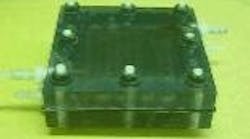Scientists at Pennsylvania State University, University Park, Pa., have developed a technology that can turn raw sewage into raw power. The device, called a microbial fuel cell, provides a clean energy source with the potential for enormous financial savings due to reduced electricity use, researchers say.
So far, experiments have produced between 10 mW and 50 mW of power per square meter of electrode surface, or about 5% of the amount needed to run one small Christmas tree light. At the same time, the process removes up to 78% of organic matter as measured by biochemical oxygen demand (BOD). As a result, the microbial fuel cell itself acts as a small wastewater treatment plant.
Such a unit would be especially attractive in developing countries. It also could be used to treat waste from animal farms, food-processing plants and even manned space missions.
Similar in design to a hydrogen fuel cell, the microbial fuel cell captures electrons that are naturally released by bacteria as they digest organic matter, and then it converts the electrons into electrical current. Dr. Bruce Logan, an environmental engineer at Penn State, doesn’t envision using his microbial fuel cell for the same type of applications as hydrogen fuel cells, such as in automobiles or houses. “We see using this any place where there’s a high concentration of organic matter,” he says.
Logan plans to build a larger version of his microbial fuel cell for demonstrations; he hopes to have the design completed in about six months. “Our goal is a system, around a cubic yard in volume, producing around 30 kWh of electricity,” he says.
